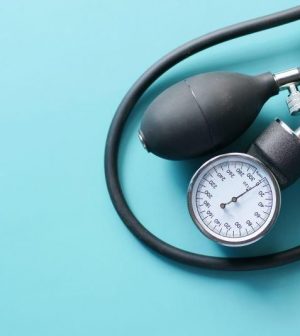- Could Your Grocery Store Meat Be Causing Recurring UTIs?
- Are You Making This Expensive Thermostat Error This Winter?
- Recognizing the Signs of Hypothyroidism
- 10 Strategies to Overcome Insomnia
- Could Artificial Sweeteners Be Aging the Brain Faster?
- Techniques for Soothing Your Nervous System
- Does the Water in Your House Smell Funny? Here’s Why
- Can a Daily Dose of Apple Cider Vinegar Actually Aid Weight Loss?
- 6 Health Beverages That Can Actually Spike Your Blood Sugar
- Treatment Options for Social Anxiety Disorder
Keeping Blood Pressure Under Control May Be Tougher in Colder Weather

Winter months can be a challenge for those trying to keep their high blood pressure in check, new research suggests.
In an analysis of more than 60,000 American adults being treated for high blood pressure at six health care centers in the Southeast and Midwest United States, scientists found that systolic blood pressure — the top number — rose slightly in winter months, by up to 1.7 mm Hg. Meanwhile, population blood pressure control rates decreased by 5% in the winter compared to control rates from the summer.
These findings were presented Thursday at the American Heart Association’s Hypertension Scientific Sessions 2023.
“Despite the smaller degree of systolic blood pressure variation in comparison to previous studies on seasonality in blood pressure, we were surprised to observe a large degree of change in blood pressure control between winter and summer months,” said study author Robert Barrett, a software engineer at the American Medical Association.
“Individuals with hypertension or values near the range of hypertension may benefit from periodic blood pressure monitoring and improvements in physical activity and nutritional patterns during winter months, to offset adverse effects from seasonal blood pressure changes,” he said in a meeting news release.
During the review, each of the participants remained on the blood pressure medication that had been prescribed for them. They were seen at centers ranging from small federally funded nonprofit health centers or clinics to large academic medical centers.
The seasonal testing was done in December through February for winter and June through August for summer from 2018 to 2023.
Study participants were an average age of 62, while 52.3% were white and 59.7% were female.
Future investigation might include analyzing the frequency of heart disease and deaths during each season, the authors added.
Study limitations include that the electronic health records did not capture a complete health history for each participant.
The heart association’s meeting is taking place in Boston from Sept. 7 to Sept. 10. Research presented at meetings should be considered preliminary until published in a peer-reviewed medical journal.
More information
The World Health Organization has more on hypertension.
SOURCE: American Heart Association, news release, Sept, 7, 2023
Source: HealthDay
Copyright © 2026 HealthDay. All rights reserved.










